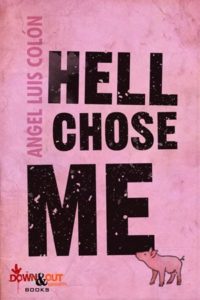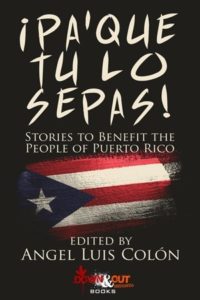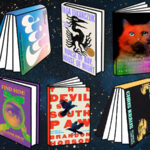Angel Luis Colón is an author exploding with projects, creativity and rage.
The creator of Blacky Jaguar, and the recently published Hell Chose Me, married father of two, Angel makes time to produce the bastard title podcast and create an anthology іPa’Que Tu Lo Sepas! to benefit Puerto Rican relief, all while working on a literary novel, a satire, and more Blacky Jaguar.
We spoke by phone and via email, this conversation has been edited for clarity.
DZ: I had so much fun reading Hell Chose Me that I went back and read those two novellas of yours featuring Blacky Jaguar. I thought, hmm, I see some recurring themes here: violence, anger, off the chart protagonists—why this genre? Why these characters?
ALC: Crime was something that I really didn’t gravitate to naturally. My first loves were horror and literary fiction. Being a kid from the Bronx it never really struck me that you could write about the Bronx. I don’t know why; I imagine because when things are too close to home you just don’t see them from that perspective. When I really discovered the newer wave of crime fiction in the last ten years, I got exposed to that from places like Beat to a Pulp, Needle Magazine. So it’s kind of funny to realize, oh, people like this? I can write stories about this?
In the Bronx hanging out in bars in Riverdale between Yonkers is a stretch known as a little Ireland area, McLean Avenue. Blacky Jaguar, Bryan Walsh were the people I met when I was a teenager, training to be a drinker [laughs] So it was always something I thought about, and the characters were shockingly easy to write.
DZ: When I began reading your books, I didn’t know your background, but I read your name on the cover, and it struck me, why is he writing about Irish guys?
ALC: My name is Angel Luis Colón, but I am part Irish. I was never really exposed to my Irish side growing up as a young kid. It’s always been the part of my background that I never really paid much attention to until I was exposed to more Irish culture. What I found was shockingly familiar to the Puerto Rican side of me, and surprisingly familiar in a lot of different ways.
DZ: That’s an interesting connection that wouldn’t have occurred to me. What do you mean?
ALC: Like knowing all the country folk, and meeting people, seeing the similarities. This comes down to rural living. In my experience, we’re all pretty much the same when we have to fend for ourselves and kill what we eat or find ways to distract ourselves without urban trappings. It just kind of blew my mind that these two side were really not that different. The bones of the two sides are more similar than we like to admit. My family line came from Puerto Rico; a lot of people don’t know that the island was open to economic interests in the early 1900s which in turn brought in a lot of European folks and started a lot of new families, which is where I come from.
DZ: And 50% of US citizens don’t even realize that Puerto Ricans are US citizens. We’ll talk more about that when we discuss your upcoming anthology. While reading Hell Chose Me, another thing that stood out was the violence. I felt like a left that book with concussions and a body cast, like my teeth were missing—How did you get this incredible, visceral, violent writing done?
ALC: That owes more to my horror background. I was a big gore hound growing up. My uncles were all at fault for introducing me to things that I shouldn’t have been introduced at such a young age. I was not a violent kid. (Although I was in fights when I had to be!) A lot of people comment on the violence. I don’t know if it’s a good thing or a bad thing, I didn’t think it was that bad!
When I really fell in love with writing I fell in love with the work of Clive Barker and Jack Ketchum, who were part of splatter punk late 80s early 90s in horror. A lot of those sensibilities stayed with me, especially when describing body damage. I tend to obsess about the physics of movement. I try very hard to really do cause and effect and display how violence and the human body come together to make something horrible.
A lot of times writers forget that trauma like that is egregious. I think it should be conveyed as such.
DZ: What’s really fun of course is that Black Jaguar just revels in the violence.
ALC: Blacky’s my cartoon character. He’s kinda like my Tom and Jerry guy. With him I cut loose and have fun.
DZ: If Blacky’s a cartoon, and Bryan’s the adult, then Bryan’s complicated.
ALC: He’s very mentally ill. He has an immense amount of issues; he comes from a very toxic family. I wanted to write a person that would scare even Blacky Jaguar. This was a very weird way of me handling issues of my own mother. What I lean into as I write is: what is my nightmare scenario? A guy like Bryan had anger issues, that maybe, if he was raised better, with support systems, might have been a fairly normal guy. He’d be street, he’d probably have a mouth on him, not too different from me! But what would be the nightmare scenario of a person like Bryan, and how far does this go? How low can a person get? From making the dysfunction worse, and spiraling out of control, he is the worst-case scenario human that I can think of.
DZ: And yet, I was really rooting for him. They talk about unlikeable characters, but I really always wanted to know what was going to happen next for this guy. Even though he is so terrible.
ALC: There’s a difference between an unlikeable character and a bad character. If a character’s unlikeable but interesting, you’re still going to stick around for the ride.
DZ: It didn’t matter how awful he was, on every single page I wanted to know what would happen next. What could possibly happen?
ALC: I think my north star for all that, especially when you want to write crummy people—someone people can’t help but be addicted to—is telenovelas. They always have the most garish over-dramatic scumbag villains who end up becoming the stars of the show! [laughter]
DZ: I’m excited to be a part of the upcoming anthology іPa’Que Tu Lo Sepas!. What galvanized you?
ALC: Initially it was just anger. I’ll be the first to admit that 90% of my success is rooted in trying to flip off the rest of the world. This isn’t the first time Puerto Rico has had problems.
Puerto Rico is probably the scariest example of social experimentation that people don’t pay attention to. From its takeover after the Spanish-American war, turned into a US territory, the citizens have always been mistreated, including being experimented on, exploited. It’s the history of that island. It’s been a complete horror show for a century.
I’ve never been active in regard to anything political about Puerto Rico itself. I was born in the city, my parents and (two of my) grandparents were too. I was never super exposed to the islands as much as many people. I maybe visited once a year as a kid, I hadn’t been back in twenty years. As a Nuyorican there’s already a weird relationship between the Nuyoricans and the Puerto Ricans from the island.
With everything that’s been happening, but especially after Hurricane Maria and seeing what happened to the island. I just got sick of sitting around and waiting for someone else to do something. I took a hard look in my writing community and I saw no action. That’s of course compounded by the fact that there’s barely any representation to begin with, at least from a Latinx perspective, and all of that culminated in this project, іPa’Que Tu Lo Sepas!
DZ: Many of us, up until the election, thought we were doing the right things. And then we realized whatever we had been doing wasn’t enough.
ALC: Yeah, it’s a mix of things. I don’t think I’ve ever been this aware of my ethnic identity. It’s a positive and a negative. It’s definitely a combination of the publishing industry and current events that are still intensely segregated, which still bar people of color, the LGBTQIA community. There are times being a token or put in a literary ghetto and we’ll decide when you get your time to shine. I used to think that mindset was extreme, until it happened to me. It becomes a frustrating factor of being a Latinx writer. I obviously have a lot of privilege of my own, as a male, as a white Latinx writer who can pass. But I can cop to the fact that I never appreciated how bad it could be until it happened a little bit to me, which, if you think about it, is a little shitty of me. But I take these things and learn and put them into a new perspective.
Everything right now is a smoke screen for attacking people of color.
DZ: How did the process go?
ALC: It was easy, I’m so happy with all the writers. Stellar cast. Everyone made things easy. What I hope from this is that people discover these writers, start buying their work, and have a positive effect outside of raising some money for Puerto Rico.
I’ve reached out to people, we’ll see what we’ll do next, because I want to incorporate Afro-Latinx/Queer Latinx representation. Maybe every 18 months we do something like this, and really help people find these writers, because they’re out there and they deserve to be heard.
DZ: You’re raising a family, writing a satire, writing a literary novel. And yet you’ve found time to produce a podcast. Why is that?
ALC: Another situation of being annoyed at something! A situation of representation. Crime writing is a little too white and too male. If we say we need diverse voices, then we gotta push these voices ahead. Everybody and their mother has a podcast, it’s not that hard to set up. Why don’t we try to do something where we prioritize marginalized voices? Women, authors of color, queer representation? I really wanted first and foremost to prove to people there are a lot of voices in this community, a lot of voices worth hearing. On top of it listening to them talk about craft, not your standard advertising for a book. The focus is the author, the craft, the voice, the diversity of these people as humans. Maybe that is a better way of getting folks who are a little too entrenched in their little cages to open their minds a little bit.
If I can convince a person that a black writer or a queer Latinx writer is a human first, before they are a writer or a product, and persuade them to pick up one book of theirs, then I did my job.
DZ: Did you say, “I write to flip off the world?”
ALC: Yeah, I’ll admit that. A lot of my fictions are written out of spite. The Bronx is an interesting borough in the sense that we are obsessed with respect. When we don’t feel respect has been given to us—we tend to make sure that doesn’t happen again. That can become incredibly self-destructive, depending on how deeply you get into it. It’s both charming and a negative aspect.
DZ: Both of your characters are deeply self-destructive, and incredibly entertaining along the way.
ALC: That’s the Bronx.






















